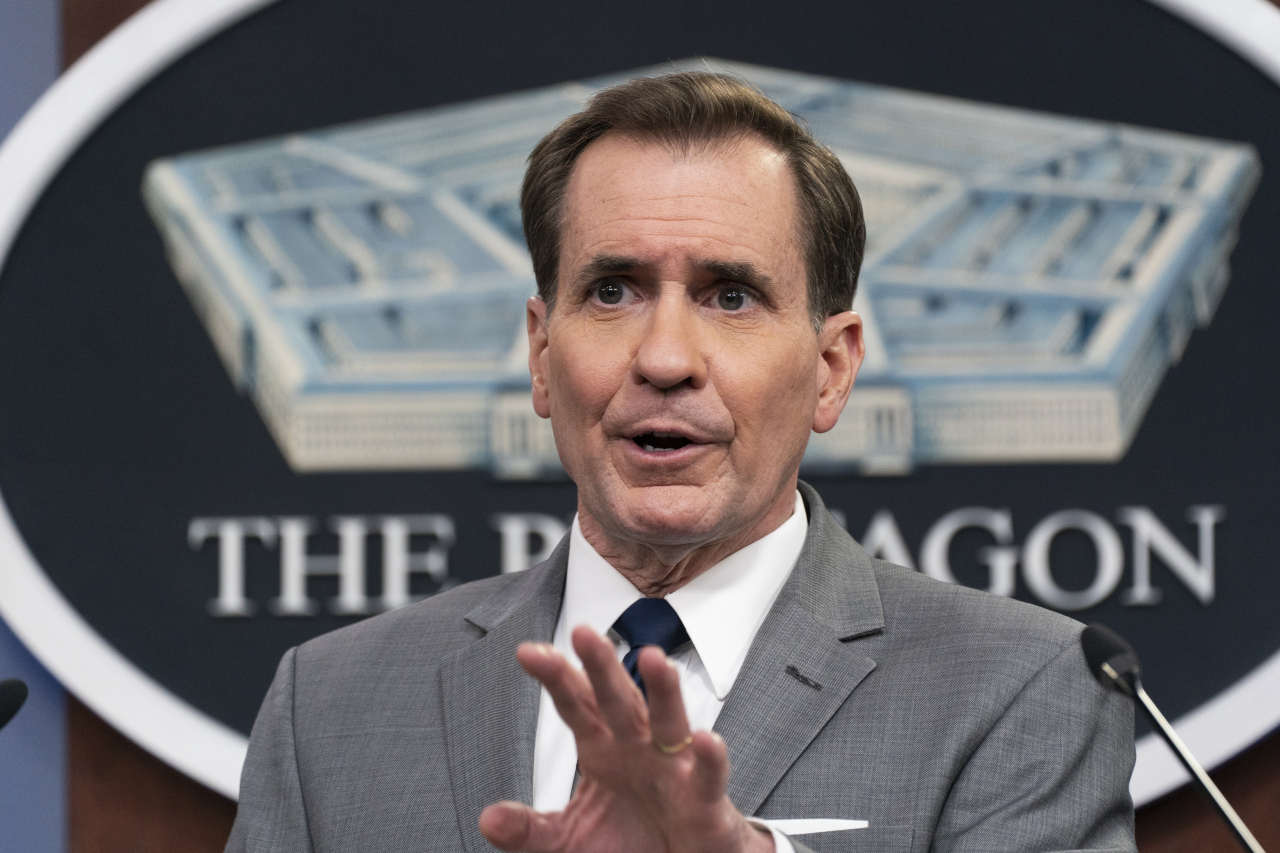 |
Pentagon Press Secretary John Kirby briefs reporters on a range of Defense Department issues at the Pentagon. (Yonhap) |
The US Defense Department on Monday urged China to use its leverage to support and enforce UN Security Council resolutions and enact new UN sanctions, while reiterating its call on North Korea to cease “provocations” and de-escalate tensions.
The Pentagon pointed out Beijing’s stonewalling on the international community’s efforts to implement UN economic sanctions on North Korea.
Pentagon press secretary John Kirby said China, the “direct neighbor of North Korea,” should exert its leverage.
“They have influence in Pyongyang. We know that. They know that. Pyongyang knows that,” Kirby said during a press briefing when asked if Washington views Beijing as intentionally turning a blind eye to North Korea’s ballistic missile launches amid the growing US-China rivalry.
“We’ve continued to call on China to use the influence that it has to support the international community and UN Security Council resolutions that China themselves have signed up for, to help get them enacted and to support the sanctions.”
The Defense Department press secretary went on to say that Washington urged Beijing to “enforce them (sanctions) in a comprehensive, cohesive way, which the Chinese have not always done.”
Monday’s comments came days after China and Russia on Thursday reportedly placed a hold on the US proposal to blacklist five North Korean officials designated by the Treasury Department for procuring missile-applicable goods from the two countries.
The Biden administration has pressed China and Russia to join its diplomatic efforts to hold the Kim Jong-un regime responsible for a spate of ballistic missile launches in violation of the UNSC resolutions.
“(We) have sanctions for a reason, and for any Member State to oppose putting sanctions on those that have been agreed to by the entire Security Council gives the DPRK a blank check,” a spokesperson for the US mission to the UN told The Korea Herald via email. “It is important that we send a unified message as said in our joint statements.”
After the UNSC meeting, Linda Thomas-Greenfield, the US ambassador to the UN, on Thursday openly admitted to “some disagreement” between Washington and Beijing over holding North Korea “accountable for their aggression.”
Meanwhile, the Pentagon on Monday expressed concerns about North Korea’s nuclear and military buildup in response to the South Korean spy agency’s assessment of North Korea’s potential intercontinental ballistic missile launch.
“We’ve been very clear about our concerns over the advancing nuclear ambitions and ballistic missile capabilities of Pyongyang,” Kirby said.
“We continue to condemn it and to call on the North to cease these provocations and to abide by international law and these Security Council resolutions and to try to find ways to de-escalate the tensions.”
During a closed-door parliamentary briefing, the National Intelligence Service on Friday said an ICBM launch is the “most probable” option that North Korea would choose to ratchet up pressure on the US among its viable political cards.
The NIS said Pyongyang could fire an ICBM at its Sohae Satellite Launching Station in Tongchang-ri under the name of launching a satellite, but it elucidated that there had been no peculiar movements at the Tongchang-ri facility.
Last week, North Korea also discussed the issue of abandoning the self-imposed moratorium on testing nuclear weapons and intercontinental ballistic missiles at a Politburo meeting of the Workers’ Party of Korea.
“We’ve said very clearly … that we’ll be willing to sit down with them (North Korea) without preconditions,” Kirby said. “They’ve shown no desire to move that forward.”
By Ji Da-gyum (
dagyumji@heraldcorp.com)








